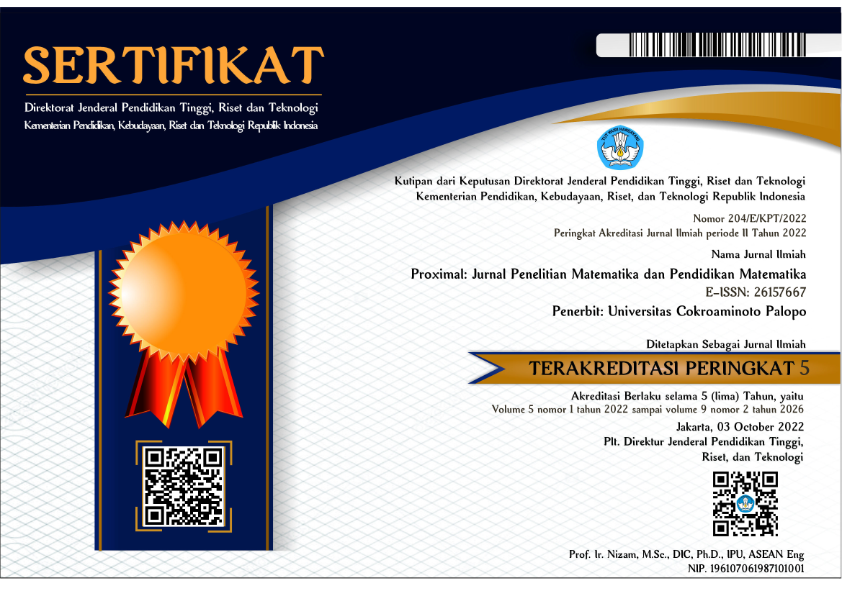PENERAPAN MODEL PEMBELAJARAN KOOPERATIF TIPE THE POWER OF TWO UNTUK MENINGKATKAN KEMAMPUAN BERPIKIR KRITIS MATEMATIS SISWA KELAS VIII SMP
Keywords:
Model pembelajaran kooperatif tipe the power of two, Kemampuan berpikir kritis matematis siswaAbstract
Penelitian ini adalah penelitian eksperimen dengan desain penelitian pretest-posttest control group design yang bertujuan untuk mengetahui kemampuan berpikir kritis matematis siswa dengan menerapkan model kooperatif tipe the power of two. Satuan eksperimen penelitian ini adalah seluruh siswa kelas VIII SMP Negeri 1 Palopo. Teknik pengambilan sampel pada penelitian ini adalah Purposive Sampling dan terpilih satu kelas eksperimen yaitu kelas VIII.F dan kelas VIII.E sebagai kelas kontrol. Kelas eksperimen diajar menggunakan model pembelajaran kooperatif tipe the power of two dan kelas kontrol diajar menggunakan model pembelajaran konvensional yaitu model pembelajaran discovery learnin. Hasil penelitian ini adalah (1) kemampuan berpikir kritis matematis siswa kelas VIII SMP Negari 1 Palopo sebelum diterapkan model pembelajaran kooperatif tipe the power of two dan model pembelajaran konvensional berada pada kategori sangat rendah; (2) kemampuan berpikir kritis matematis siswa kelas VIII SMP Negari 1 Palopo setelah diterapkan model pembelajaran kooperatif tipe the power of two berada pada kategori rendah dan model pembelajaran konvensional berada pada kategori sedang; (3) peningkatan kemampuan berpikir kritis matematis siswa yang diajar dengan model pembelajaran kooperatif tipe the power of two lebih baik daripada siswa yang diajar dengan pembelajaran konvensional; (4) tidak terdapat perbedaan kemampuan berpikir kritis matematis siswa kelas yang diajar dengan model pembelajaran kooperatif tipe the power of two dan siswa yang diajar dengan pembelajaran konvensional.
Downloads
References
Lambertus. 2009. Pentingnya Melatih Keterampilan Berpikir Kritis dalam Pembelajaran Matematika Di SD. Jurnal Pendidikan. Vol.28.No.2.
Mahmudi, A. 2018. Upaya Meningkatkan Aktivitas dan Kemampuan Pemecahan Masalah Matematika Melalui Model Pembelajaran Kooperatif Tipe STAD pada Siswa Kelas VIII SMP Negeri 1. Kedungbanteng Kabupaten Tegal. Jurnal Pendididkan Matematika,2(2).
Masithah, I. dkk. 2017. Pengaruh Model Pembelajaran Kooperatif Tipe The Power of Two (Kekuatan Berdua) terhadap Kemampuan Berpikir Kritis Siswa SMPN 11 Mataram pada Mata Pelajaran IPA Tahun Ajaran 2016/2017. Prosiding Seminar Nasional Pendidikan Biologi. ISBN: 978-602-61265-2-8.
Prihartini, E. dkk. 2016. Meningkatkan Kemampuan Berpikir Kritis Matematis Menggunakan Pendekatan Open Ended. In Prosiding Seminar Nasional Matematika. PP.58-64.
Purwanto, D. 2018. Pengaruh Metode Pembelajaran Guided Note Taking Disertai Media Interaktif terhadap Keaktifan dan Hasil Belajar Matematika Siswa Kelas VII SMP Negeri 2 Bone-Bone. Skripsi tidak Diterbitkan. Palopo: FKIP-UNCP.
Restu. 2015. Meningkatkan Kemampuan Berpikir Kritis Siswa dengan Problem Based Learning. Skripsi tidak Diterbitkan. Lampung: Universitas Lampung.
Saraswati. 2014. Penerapan Model Pembelajaran Auditory Intellectually Repetition (AIR) dengan Pendekatan Contextual Teaching and Learning (CTL) dalam Meningkatkan Kemampuan Komunikasi dan Prestasi Belajar Matematika Siswa. Skiripsi tidak Diterbitkan. Surakarta: Universitas Muhammadiyah Palopo.
Tabany, T. I. B. 2014. Mendesain Model Pembelajaran Inovatif, Progresif , dan Kontekstual. Kencana. Jakarta.
Wandira, S, M, A. dkk. 2017. Efektivitas Model Pembelajaran Kooperatif Tipe Think Pair Share dan The Power Of Two Ditinjau dari Kemampuan Pemecahan Masalah Matematis. Jurnal Pendidikan Matematika. Vol. 1, No. 1. P-ISSN: 2579-9827.
Wirajaya, L. 2019. Eksperimentasi Penerapan Model Pembelajaran The Power of Two Ditinjau dari Kemampuan Berpikir Kritis dalam Pembelajaran Matematika. Jurnal Pendidikan Dasar. Volume 3, Nomor 1. P-ISSN 2656-5390.
Wuryaningsih, S. 2013. Peningkatan Kemampuan Berpikir Kritis Matematika Melalui Strategi Pembelajaran The Power of Two Pada Siswa Kelas IV SDN Pasucen 02. Skripsi Diterbitkan. Universitas Muhammadiyah Surakarta.
Downloads
Published
How to Cite
Issue
Section
License
In submitting the manuscript to the journal, the authors certify that:
- They are authorized by their co-authors to enter into these arrangements.
- The work described has not been formally published before, except in the form of an abstract or as part of a published lecture, review, thesis, or overlay journal.
- That it is not under consideration for publication elsewhere,
- That its publication has been approved by all the author(s) and by the responsible authorities – tacitly or explicitly – of the institutes where the work has been carried out.
- They secure the right to reproduce any material that has already been published or copyrighted elsewhere.
- They agree to the following license and copyright agreement.
License and Copyright Agreement
Authors who publish with this journal agree to the following terms:
- Authors retain copyright and grant the journal right of first publication with the work simultaneously licensed under Creative Commons Attribution License (CC BY 4.0) that allows others to share the work with an acknowledgment of the work's authorship and initial publication in this journal.
- Authors are able to enter into separate, additional contractual arrangements for the non-exclusive distribution of the journal's published version of the work (e.g., post it to an institutional repository or publish it in a book), with an acknowledgment of its initial publication in this journal.
- Authors are permitted and encouraged to post their work online (e.g., in institutional repositories or on their website) prior to and during the submission process, as it can lead to productive exchanges, as well as earlier and greater citation of published work.
















